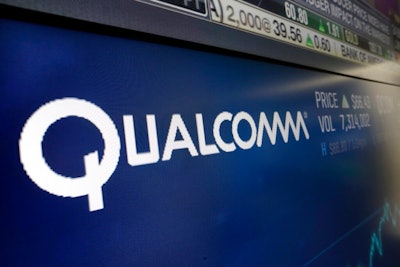
SAN FRANCISCO (AP) — A federal appeals court is temporarily protecting Qualcomm from an antitrust ruling that would have forced the mobile chipmaker to drastically change how it licenses key technology for connecting smartphones to the internet.
The 9th U.S. Circuit Court of Appeal granted a stay Friday in a high-stakes case that has pitted U.S. government agencies against each other while magnifying Qualcomm's pivotal role in an upcoming shift to ultrafast wireless connections, known as 5G.
The latest twist will prevent the Federal Trade Commission from enforcing key provisions of a lower court ruling that said Qualcomm abused its portfolio of about 140,000 patents to stifle competition.
The Justice Department, joined by the Defense and Energy departments, had taken the unusual step of urging the appeals court to stay, or put on hold, parts of that ruling in the interests of national security. They argued the ruling would hobble Qualcomm so severely that the San Diego company would have to curtail much-needed investments in the evolution to 5G, opening the door for China to gain an advantage in a critical area of technology.
Qualcomm is a leader in the 5G, along with European-based Ericsson and Nokia and China's Huawei, a company that has been blacklisted by the Trump administration because of suspected ties to its home country's government.
The shift to 5G during the next decade is expected to enable advances in robotics, wearable devices such as smartwatches and smart glasses, self-driving cars and communications.
The appeals court cited concerns from the Justice, Defense and Energy departments and said Qualcomm had "demonstrated the probability of irreparable harm" if U.S. District Judge Lucy Koh's ruling is immediately imposed.
Qualcomm argued Koh's provisions would have unfairly eroded its revenue and potentially given away its technological secrets. The stay will prevent that from happening while Qualcomm pursues its appeal. Oral arguments are scheduled for January.
Until then, the stay will allow Qualcomm "to continue to invest in inventing the fundamental technologies at the heart of mobile communications at this critical time of transition to 5G," said Don Rosenberg, the company's general counsel.
The FTC expressed disappointment with the stay, but promised to monitor Qualcomm's business practices during the appeal.
Qualcomm's stock shed $2.39, or 3%, to $74.76 in Friday's afternoon trading, primarily driven down by a widespread sell off in major technology companies as investors worried about how Trump's escalating trade war with China will affect the industry's future profits.





















